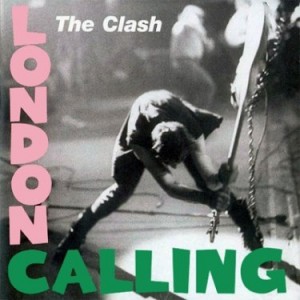
London Calling's Cover Was Shot By Pennie Smith. The Photo Would Eventually Be Voted The Best Rock & Roll Image Ever By Q Magazine.
A single, seemingly innocuous event might modify the way people approach something forever.That is something nobody could avoid thinking when reviewing “London Calling”, The Clash’s third album. As everybody knows, this album was named the greatest record of the ’80s by Rolling Stone magazine. That is all the more interesting if only because it came out in 1979, not 1980. But that is a different story…
The fact is that there are many people who swear by it owing to that. That couldn’t be avoided, but fans of The Clash are constantly irked by such a situation. It gives their best-loved band popularity alright, but not the kind of popularity that could conduce to a critical analysis of their music and its true merits.
And the music found on London Calling deserves as much of an objective overview as possible. The album (which was a two-record set that retailed at the price of one) marked the moment The Clash started experimenting and letting in more influences into their basic sound.
In actuality, there is only one “punk” song, and that is the title track. It is a masterpiece of sustained tension – the bass is apocalyptic, the guitars emulate a siren near the end, Joe wails his head off… It is one of their better-known songs, and deservedly so.
At the other end of the spectre we have the closing number (which is not listed on the sleeve), a song penned by Mick named “Train In Vain”. It is a (good) poppy tune that still gets airplay today. It was one of the two songs the local station where I live played when Joe passed away a couple of years back, along with “Should I Stay Or Should I Go” (yuck!). As much as I enjoy it, whether such a song deserves to be played over others like “Complete Control” or “White Man In Hammersmith Palais” is debatable. And you know which side I am on by now.
The rest of the album includes classic rock (“Brand New Cadillac”, “Lovers’ Rock”), pop (Mick Jones’ poignant “Lost In The Supermarket”) and an excellent dose of reggae (“Wrong’em Boyo”, “Revolution Rock” and Simonon’s “The Guns Of Brixton”). With the exception of “Lovers’ Rock”, these are all standout tunes. I am very keen on “Lost In The Supermarket”, a song that deals with something which falls in the category Morrissey once termed “the riches of the poor”. It is a startling song as it depicts reality for different social groups very vividly – something as mundane as shopping is a whole adventure for one of them. If that is so pivotal, what role does music occupy? How is it appreciated? Must you have little in order to feel a lot?
But the two songs that reach the highest are the politically-charged “Spanish Bombs” and “Clampdown”. The latter in particular is one of their most direct and radical songs about “evil presidentes” and systems that want to rob you “the best years of your life”. And the song has a stop-and-start structure that makes it very noticeable the first time around.
The thin line which separates youth from adulthood (and music from reality, by extension) is analyzed on the powerful “Death Or Glory”, including the timeless lines “but I believe in this and it’s been proven by research/he who fucks nuns will later join the Church”. Ha.
This leaves us with a couple of songs that are either despised or revered. They are “The Right Profile” (about Montgomery Cliff), “Jimmy Jazz” and the layered, ambitious “The Card Trick” with Micky Gallagher on piano (a role he would reprise in “Sandinista!“). These songs constitute the contingent that strays the farthest from their classic sound, and that might be the reason why they are a bit disconcerting upon first listens. But once you have given “Sandinista!” a try it is all the more supple.
The songs that don’t really work include “Four Horsemen” (filler at its best) and the short and slight “Koka Kola”, but I must admit that the sound effects of the latter make me smile a couple of times.
Does “London Calling” deserve all the hype it usually elicits? No. Not because it is “bad” (it is not), but simply because no album should be put on a pedestal and revered blindly. Not even “Who’s Next“, not even “Dark Side Of The Moon”. Not even the Beatles “Sgt. Peppers'”. But what London Calling deserves (because it earns it right away) is the most comprehensive listen you can give it. I am sure you will arrive at the conclusion it is the most balanced and realized work a band that was seldom matched and never equaled produced. But arrive at that conclusion. Don’t repeat it because you read that somewhere.
Rating: 8.5/10

Pingback: The Clash – General Introduction | MusicKO
Pingback: Sandinista! (The Clash) – Album Review | MusicKO